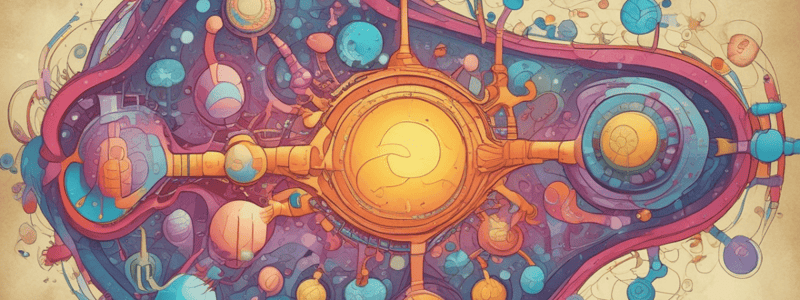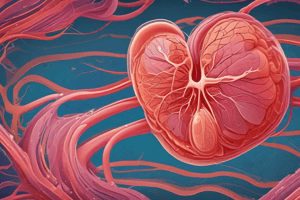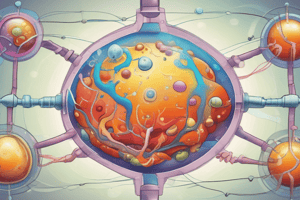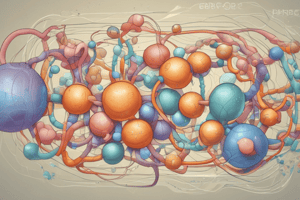Podcast
Questions and Answers
What is the selective advantage created by the increase in atmospheric O2?
What is the selective advantage created by the increase in atmospheric O2?
- Enhanced ability to breakdown glucose to CO2 and H2O
- Ability to undergo anaerobic glycolysis
- Increased ATP production via photosynthesis
- Capability to use O2 in energy-producing reactions (correct)
What is the energy yield of the complete oxidative breakdown of glucose to CO2 and H2O?
What is the energy yield of the complete oxidative breakdown of glucose to CO2 and H2O?
- Equivalent to 50-60 molecules of ATP
- Equivalent to 2 molecules of ATP
- Equivalent to 36-38 molecules of ATP (correct)
- Equivalent to 12-15 molecules of ATP
What is the characteristic of thermacidophiles?
What is the characteristic of thermacidophiles?
- They live in hot environments with low pH values (correct)
- They live in hot environments with high pH values
- They live in cold environments with high pH values
- They live in cold environments with low pH values
What is the timeline for the evolution of all forms of life from the original prokaryotes?
What is the timeline for the evolution of all forms of life from the original prokaryotes?
What is the division of present-day prokaryotes?
What is the division of present-day prokaryotes?
What is the likely sequence of events in the evolution of life on Earth?
What is the likely sequence of events in the evolution of life on Earth?
What is believed to be the primary energy source utilized by the first photosynthetic bacteria?
What is believed to be the primary energy source utilized by the first photosynthetic bacteria?
What is a by-product of photosynthetic reactions that has a profound impact on the environment?
What is a by-product of photosynthetic reactions that has a profound impact on the environment?
What is the name of the molecule that is used as a source of energy to drive other metabolic reactions?
What is the name of the molecule that is used as a source of energy to drive other metabolic reactions?
What is the name of the metabolic pathway that converts the energy in preformed organic molecules into ATP?
What is the name of the metabolic pathway that converts the energy in preformed organic molecules into ATP?
What is thought to have evolved as a result of the abundance of oxygen in the Earth's atmosphere?
What is thought to have evolved as a result of the abundance of oxygen in the Earth's atmosphere?
Approximately how many years ago did the first photosynthetic bacteria evolve?
Approximately how many years ago did the first photosynthetic bacteria evolve?
What was the primary source of energy for the transformation of molecules into organic molecules, according to Aleksandr Ivanovich Oparin?
What was the primary source of energy for the transformation of molecules into organic molecules, according to Aleksandr Ivanovich Oparin?
What was the result of the introduction of oxygen into the atmosphere, with respect to Abiogenesis?
What was the result of the introduction of oxygen into the atmosphere, with respect to Abiogenesis?
What was the purpose of the Miller-Urey experiment?
What was the purpose of the Miller-Urey experiment?
What was the composition of the primitive atmosphere, according to Oparin's revised hypothesis?
What was the composition of the primitive atmosphere, according to Oparin's revised hypothesis?
What was the result of the increase in oxygen in the atmosphere, with respect to the Earth's protection?
What was the result of the increase in oxygen in the atmosphere, with respect to the Earth's protection?
What stage of chemical evolution was characterized by the formation of simple organic substances, such as amino acids?
What stage of chemical evolution was characterized by the formation of simple organic substances, such as amino acids?
What is the primary mechanism by which 'building block' molecules gave rise to macromolecules during chemical evolution?
What is the primary mechanism by which 'building block' molecules gave rise to macromolecules during chemical evolution?
According to one theory, where might the 'building block' molecules have originated from?
According to one theory, where might the 'building block' molecules have originated from?
What is the term for the synthesis of biochemically important molecules from smaller molecules and chemical elements?
What is the term for the synthesis of biochemically important molecules from smaller molecules and chemical elements?
What is the name of the scientist who introduced the term 'chemical evolution' and is best known for unraveling the secrets of photosynthesis?
What is the name of the scientist who introduced the term 'chemical evolution' and is best known for unraveling the secrets of photosynthesis?
What is thought to have formed the Sun and its planets from the disk-shaped cloud of dust?
What is thought to have formed the Sun and its planets from the disk-shaped cloud of dust?
What is the term for the event that concentrated all matter in a single mass and then blew apart?
What is the term for the event that concentrated all matter in a single mass and then blew apart?
What is the primary reason for the acquisition of aerobic bacteria by anaerobic cells according to the endosymbiotic theory?
What is the primary reason for the acquisition of aerobic bacteria by anaerobic cells according to the endosymbiotic theory?
What is the current state of most genes from the original bacteria in the endosymbiotic theory?
What is the current state of most genes from the original bacteria in the endosymbiotic theory?
What is the characteristic shared by both mitochondria and chloroplasts according to the endosymbiotic theory?
What is the characteristic shared by both mitochondria and chloroplasts according to the endosymbiotic theory?
What is the hypothesized origin of chloroplasts according to the endosymbiotic theory?
What is the hypothesized origin of chloroplasts according to the endosymbiotic theory?
What was the primary advantage of the acquisition of photosynthetic bacteria by cells according to the endosymbiotic theory?
What was the primary advantage of the acquisition of photosynthetic bacteria by cells according to the endosymbiotic theory?
What is the key factor that drove the selection of cells containing aerobic bacteria and photosynthetic bacteria during evolution?
What is the key factor that drove the selection of cells containing aerobic bacteria and photosynthetic bacteria during evolution?
In phospholipid molecules, the phosphate-containing head groups are water-insoluble.
In phospholipid molecules, the phosphate-containing head groups are water-insoluble.
The first cell is thought to have arisen by the enclosure of self-replicating DNA in a membrane composed of phospholipids.
The first cell is thought to have arisen by the enclosure of self-replicating DNA in a membrane composed of phospholipids.
RNA is capable of catalyzing the breakdown of nucleotides.
RNA is capable of catalyzing the breakdown of nucleotides.
Phospholipid membranes are impermeable to nutrients and energy from the environment.
Phospholipid membranes are impermeable to nutrients and energy from the environment.
The bilayer formation of phospholipid membranes occurs with the phosphate-containing head groups on the inside and the hydrocarbon chains on the outside.
The bilayer formation of phospholipid membranes occurs with the phosphate-containing head groups on the inside and the hydrocarbon chains on the outside.
The first cell was able to self-reproduce and further evolve due to the enclosure of self-replicating RNA and associated molecules in a protein membrane.
The first cell was able to self-reproduce and further evolve due to the enclosure of self-replicating RNA and associated molecules in a protein membrane.
The term 'chemical evolution' refers to the process of smaller molecules forming into macromolecules through polycondensation.
The term 'chemical evolution' refers to the process of smaller molecules forming into macromolecules through polycondensation.
The Calvin cycle is a metabolic pathway that converts energy in preformed organic molecules into ATP.
The Calvin cycle is a metabolic pathway that converts energy in preformed organic molecules into ATP.
The Big Bang theory proposes that the Earth and its planets were formed from a single, condensed mass of dust.
The Big Bang theory proposes that the Earth and its planets were formed from a single, condensed mass of dust.
The formation of macromolecules from building block molecules occurred only in the lithosphere of young Earth.
The formation of macromolecules from building block molecules occurred only in the lithosphere of young Earth.
The heat produced by the Big Bang led to the compaction of the Earth and the formation of its crust.
The heat produced by the Big Bang led to the compaction of the Earth and the formation of its crust.
Melvin Calvin is best known for explaining the process of abiogenesis through the 'Calvin cycle'.
Melvin Calvin is best known for explaining the process of abiogenesis through the 'Calvin cycle'.
The Miller-Urey experiment used a warm flask representing the primordial Earth's atmosphere.
The Miller-Urey experiment used a warm flask representing the primordial Earth's atmosphere.
The Miller-Urey experiment successfully reproduced the conditions of primitive Earth.
The Miller-Urey experiment successfully reproduced the conditions of primitive Earth.
The Miller-Urey experiment demonstrated the spontaneous synthesis of organic molecules in a week.
The Miller-Urey experiment demonstrated the spontaneous synthesis of organic molecules in a week.
The Miller-Urey experiment used enzymes to assist in the synthesis of organic molecules.
The Miller-Urey experiment used enzymes to assist in the synthesis of organic molecules.
The condenser in the Miller-Urey experiment was used to heat the atmosphere.
The condenser in the Miller-Urey experiment was used to heat the atmosphere.
The Miller-Urey experiment proved that simple substances can give rise to the chemical building blocks of organisms.
The Miller-Urey experiment proved that simple substances can give rise to the chemical building blocks of organisms.
Only proteins can direct their self-replication.
Only proteins can direct their self-replication.
Protobionts grew and split, and their RNA sequences best suited to environmental parameters did not pass on to offspring.
Protobionts grew and split, and their RNA sequences best suited to environmental parameters did not pass on to offspring.
Macromolecules capable of replicating themselves were not capable of evolution.
Macromolecules capable of replicating themselves were not capable of evolution.
RNA synthesis occurs before protobiont synthesis in the stages of chemical evolution.
RNA synthesis occurs before protobiont synthesis in the stages of chemical evolution.
The diversity of prokaryotic cells came into existence due to natural selection operating on different RNAs.
The diversity of prokaryotic cells came into existence due to natural selection operating on different RNAs.
The ability to replicate itself is not a characteristic of macromolecules that evolved into life.
The ability to replicate itself is not a characteristic of macromolecules that evolved into life.
Sydney Fox suggested that waves or rain in the primitive environment could’ve provided enough energetic force to form polymers abiotically on the cold, frozen surface of young Earth.
Sydney Fox suggested that waves or rain in the primitive environment could’ve provided enough energetic force to form polymers abiotically on the cold, frozen surface of young Earth.
Protobionts are capable of reproducing and have all characteristics of living things.
Protobionts are capable of reproducing and have all characteristics of living things.
RNA molecules were found to function as enzymes in cells by Thomas Cech and his associates in 1950.
RNA molecules were found to function as enzymes in cells by Thomas Cech and his associates in 1950.
Variations of RNA molecules could have been produced during replication without mutations and errors.
Variations of RNA molecules could have been produced during replication without mutations and errors.
Protobionts are described to have impermeable and non-excitable membranes similar to those found in modern day cells.
Protobionts are described to have impermeable and non-excitable membranes similar to those found in modern day cells.
The final stage of chemical evolution suggests that polymers developed the ability to reproduce and pass genetic information from one generation to the next.
The final stage of chemical evolution suggests that polymers developed the ability to reproduce and pass genetic information from one generation to the next.
In the phospholipid bilayer, the phosphate-containing head groups face inward, while the hydrocarbon chains face outward.
In the phospholipid bilayer, the phosphate-containing head groups face inward, while the hydrocarbon chains face outward.
The ATP generated in glycolysis is used to drive other metabolic reactions.
The ATP generated in glycolysis is used to drive other metabolic reactions.
Photosynthesis is thought to have evolved before glycolysis.
Photosynthesis is thought to have evolved before glycolysis.
The evolution of oxidative metabolism is thought to have occurred in response to the abundance of oxygen in the Earth's atmosphere.
The evolution of oxidative metabolism is thought to have occurred in response to the abundance of oxygen in the Earth's atmosphere.
The bilayer formation of phospholipid membranes occurs spontaneously in aqueous environments.
The bilayer formation of phospholipid membranes occurs spontaneously in aqueous environments.
The development of photosynthesis allowed cells to harness energy from preformed organic molecules.
The development of photosynthesis allowed cells to harness energy from preformed organic molecules.
In phospholipid molecules, the phosphate-containing head groups are hydrophilic.
In phospholipid molecules, the phosphate-containing head groups are hydrophilic.
Phospholipid membranes are selectively permeable to nutrients and energy from the environment.
Phospholipid membranes are selectively permeable to nutrients and energy from the environment.
The Calvin cycle is a metabolic pathway that converts light energy into ATP.
The Calvin cycle is a metabolic pathway that converts light energy into ATP.
The Big Bang theory proposes that the Sun and its planets formed from a disk-shaped cloud of dust.
The Big Bang theory proposes that the Sun and its planets formed from a disk-shaped cloud of dust.
The Miller-Urey experiment demonstrated the spontaneous synthesis of organic molecules from inorganic substances.
The Miller-Urey experiment demonstrated the spontaneous synthesis of organic molecules from inorganic substances.
RNA molecules can catalyze chemical reactions, including the breakdown of nucleotides.
RNA molecules can catalyze chemical reactions, including the breakdown of nucleotides.
Phospholipid molecules have phosphate-containing head groups that are soluble in water.
Phospholipid molecules have phosphate-containing head groups that are soluble in water.
The first cell is thought to have arisen by the enclosure of self-replicating RNA in a protein membrane.
The first cell is thought to have arisen by the enclosure of self-replicating RNA in a protein membrane.
Protobionts grew and split, and their RNA sequences best suited to environmental parameters passed on to offspring.
Protobionts grew and split, and their RNA sequences best suited to environmental parameters passed on to offspring.
Only proteins can direct their self-replication.
Only proteins can direct their self-replication.
The bilayer formation of phospholipid membranes occurs with the phosphate-containing head groups on the outside and the hydrocarbon chains on the inside.
The bilayer formation of phospholipid membranes occurs with the phosphate-containing head groups on the outside and the hydrocarbon chains on the inside.
Nucleic acids cannot serve as templates for synthesis because of nonspecific base pairings between complementary nucleotides.
Nucleic acids cannot serve as templates for synthesis because of nonspecific base pairings between complementary nucleotides.
The complete breakdown of glucose to CO2 and H2O through oxidative metabolism yields energy equivalent to 2 molecules of ATP.
The complete breakdown of glucose to CO2 and H2O through oxidative metabolism yields energy equivalent to 2 molecules of ATP.
Phospholipid membranes are impermeable to nutrients and energy from the environment.
Phospholipid membranes are impermeable to nutrients and energy from the environment.
The bilayer formation of phospholipid membranes occurs with the phosphate-containing head groups on the outside and the hydrocarbon chains on the inside.
The bilayer formation of phospholipid membranes occurs with the phosphate-containing head groups on the outside and the hydrocarbon chains on the inside.
Oxidative metabolism is a less efficient way of generating energy from organic molecules compared to anaerobic glycolysis.
Oxidative metabolism is a less efficient way of generating energy from organic molecules compared to anaerobic glycolysis.
The evolution of oxidative metabolism occurred after the development of photosynthetic reactions.
The evolution of oxidative metabolism occurred after the development of photosynthetic reactions.
All forms of life are theorized to have evolved from the original eukaryotic cells.
All forms of life are theorized to have evolved from the original eukaryotic cells.
Mitochondria and chloroplasts both contain their own DNA that encodes some of their components.
Mitochondria and chloroplasts both contain their own DNA that encodes some of their components.
The acquisition of aerobic bacteria would have provided cells with the ability to perform photosynthesis.
The acquisition of aerobic bacteria would have provided cells with the ability to perform photosynthesis.
Most genes in the original bacterial DNA are still unique to the chloroplast and mitochondrial DNA.
Most genes in the original bacterial DNA are still unique to the chloroplast and mitochondrial DNA.
Mitochondria are thought to have evolved from photosynthetic bacteria.
Mitochondria are thought to have evolved from photosynthetic bacteria.
The association between cells and aerobic bacteria was advantageous to the cells and allowed them to carry out oxidative metabolism.
The association between cells and aerobic bacteria was advantageous to the cells and allowed them to carry out oxidative metabolism.
Chloroplasts and mitochondria are similar in size to eukaryotic cells.
Chloroplasts and mitochondria are similar in size to eukaryotic cells.
Flashcards are hidden until you start studying
Study Notes
Evolution of Metabolic Pathways
- There is debate on whether oxidative metabolism came before or after photosynthetic reactions
- Debates for oxidative metabolism BEFORE photosynthesis:
- Increase in atmospheric O2 created a strong selective advantage for organisms capable of using O2 in energy-producing reactions
- O2 is a highly reactive molecule, and oxidative metabolism provided a mechanism for generating energy from organic molecules more efficiently than anaerobic glycolysis
- Complete oxidative breakdown of glucose to CO2 and H2O yields energy equivalent to 36-38 molecules of ATP, compared to 2 ATP formed by anaerobic glycolysis
Evolution through Glycolysis and Photosynthesis
- Glycolysis provided a mechanism for converting energy from preformed organic molecules (e.g., glucose) to ATP
- Development of photosynthesis allowed cells to harness energy from sunlight, independent from glucose utilization
- First photosynthetic bacteria, which evolved over 3 billion years ago, utilized H2S to convert CO2 to organic molecules
- Use of H2O in photosynthetic reactions produced free O2, making it abundant in Earth's atmosphere
- Release of O2 led to the development of oxidative metabolism
Prokaryotes
- First living things on Earth were prokaryotic cells, which exist today as bacteria
- Prokaryote fossils were first found in 3.4 million-year-old rock in Africa and even older rocks in Australia
- Some prokaryotes were found to be photosynthetic!
- All forms of life are theorized to have evolved from the original prokaryotes ~ 3.5-4.0 billion years ago
- Prokaryotes are divided into two groups: Archaebacteria and Eubacteria
- Archaebacteria live in extreme environments and were most prevalent in primitive Earth
- Thermoacidophiles – live in hot sulfur springs (~ 80°C and pH value as low as 2)
Chemical Evolution
- The term "chemical evolution" was introduced by Melvin Calvin
- Refers to the synthesis of biochemically important molecules from smaller molecules and certain chemical elements
- Describes chemical changes on the primitive Earth, giving rise to the first forms of life
- Building block molecules (e.g., amino acids, fatty acids, or nucleobases) may have been synthesized in the atmosphere, hydrosphere, or lithosphere of young Earth
- Another theory proposes that these molecules may not have been formed on Earth but brought from outer space by meteorites/comets
Stages of Chemical Evolution
- Stage 1: Primitive environment
- Stage 2: Accumulation of organic molecules
- Stage 3: Protobiont synthesis
- Stage 4: RNA synthesis
- Natural selection, operating on different RNAs, would have brought about subsequent evolutionary development
The First Cell
-
Presumed to have arisen by the enclosure of self-replicating RNA in a membrane composed of phospholipids
-
Phospholipids are the basic components of all present-day biological membranes
-
Phospholipid membranes are amphipathic molecules (soluble in water and not soluble in water)
-
The first cell would have maintained self-replicating RNA and associated molecules as a unit, capable of self-reproduction and further evolution### Endo-symbiotic Theory
-
Mitochondria and chloroplasts are thought to have evolved from bacteria, supporting the endo-symbiotic theory.
-
Both mitochondria and chloroplasts are similar to bacteria in size and reproduce by dividing in two.
-
They contain their own DNA, which encodes some of their components.
Evolution of Mitochondria and Chloroplasts
- Mitochondria evolved from aerobic bacteria, while chloroplasts evolved from photosynthetic bacteria.
- The acquisition of aerobic bacteria was a natural selection process for anaerobic cells to acquire oxidative metabolism as the atmosphere became more oxygen dense.
- The acquisition of photosynthetic bacteria provided nutritional independence for cells to perform photosynthesis, utilizing the Earth's ultraviolet rays.
Advantages of Endo-symbiosis
- The associations between bacteria and cells were advantageous to both parties.
- Cells containing aerobic (mitochondria) and photosynthetic (chloroplasts) were selected for during evolution.
Genetic Integration
- Over time, most genes from the original bacteria became incorporated into the nuclear genome of the cell.
- Few genes remain unique to chloroplast and mitochondrial DNA.
Studying That Suits You
Use AI to generate personalized quizzes and flashcards to suit your learning preferences.





